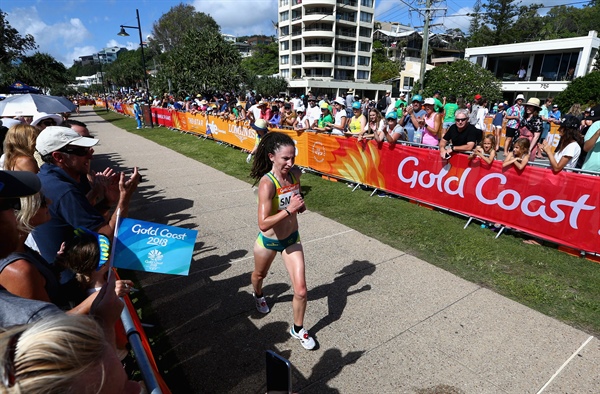Olympic Athlete, Loving Mother and Proud Aboriginal: Beki Smith on National Reconciliation Week

In commemoration of National Reconciliation Week, Little Athletics NSW is celebrating the Aboriginal athletes, coaches and volunteers who contribute to this wonderful sporting community.
Olympian Beki Smith (birthname Rebecca Lee) is one of 13 Aboriginal women to represent Australia at the Summer Olympic Games – she was also a passionate Little Athlete during her childhood.
A successful racewalker, Smith finished fourth at the 2012 Oceania & Australian Race Walking Championships in the 20km event – she also represented Australia at the 2012 London Olympics and the 2018 Gold Coast Commonwealth Games, where she placed 27th and sixth respectively.
Smith is one of only three Aboriginal Australian women to have ever competed in an Olympic athletics event, the others being Cathy Freeman and Nova Peris-Kneebone.
Working as a Student Engagement Officer within the indigenous section of the University of Canberra Ngunnawal Centre, Smith would like to see an increase of Indigenous participation in athletics, especially within rural communities.
“The talent that comes out of these young kids in rural and remote communities and just how naturally gifted they are; it’s just mind-blowing for me,” said Smith.
“We could incorporate more programs or camps where we can tap into our indigenous community. We can facilitate the coaching and put equipment back into the local communities in order for them to come through and compete at a state and national level, and hopefully one day an international level.
“Fingers crossed that come Tokyo, there will be a few more Indigenous athletes on that team; I think when I competed in London there was only six or seven across the whole Australian Olympic team across all sports.
“We’re getting there, but it’s just slow going.”
Looking ahead to the Tokyo 2020 Olympics, Smith cites Canberra-based sprinter Angeline Blackburn as a potential star that Aboriginal children could idolise, injury permitting.
“[Blackburn’s] doing quite well now and is on the road to Tokyo,” said Smith.
“She’s had some really bad injuries and has unfortunately missed out on a few Australian teams because of that, but she’s coming into good form now,” said Smith.
“Her persistence and her strength… she’s somebody [Little A’s] can definitely look up to.”

Smith has been a mother for five years, her son a fervent athlete at Corroboree Little Athletics Centre. Balancing full-time work, her athletics career and responsibilities as a mother has been a daunting task, one she admittedly continues to struggle with.
“The hardest thing is the financial burden that comes with raising a family while trying to travel the world,” said Smith.
“One of the main difficulties is finding the time to train – I would like athletics to be my full-time job; unfortunately for a lot of our athletes, that’s not the case.
“We do have to work full-time or part-time to fund our dream of getting to the Olympics.”
New South Wales high-jumper Brandon Starc is one of the sport’s most celebrated athletes, recently equalling the all-time Australian high jump record and claiming gold at the Diamond League in Brussels. Despite being one the world’s best, he still works part-time at his local Coles to make a living.
Many of the nation’s most promising athletics stars have transferred to other sports in the hope of financial security. Last week, 22-year-old sprinter Trae Williams announced his impending move to Rugby Sevens – he is the fourth-fastest Australian in history, with a 100m personal best time of 10.10 seconds.
Although Williams’ career change comes as a great loss to Australian athletics, Smith sympathises with the young sprinter.
“It’s a big blow for the relay team, but unfortunately athletics just doesn’t have the funds to keep our top-level athletes in the sport,” said Smith.
“High-profile professional sports such as rugby union and rugby 7s can offer big contracts, which is really hard to say no to when you’re a young person starting your life wanting to buy houses and planning for your future.
“Unfortunately other sports can tap into our athletes and we lose our gifted athletes… that’s the difficulty of senior athletics.”

Being a professional racewalker, Smith regularly receives criticism for her technique, particularly on social media. Despite recreational walking ranking as the most participated physical activity in Australia, very few do so competitively, or even in groups.
Smith first identified her skill for racewalking as a child; it was through the Little Athletics program that she discovered her love for the sport.
“Sport as a foundation for children is a wonderful thing and athletics for me was very inclusive,” said Smith.
“There were all different levels of gross motor skills that you can learn and that’s where I fell in love with racewalking.
“It was the event that I was kind of the best at, and you veer towards the things that you’re naturally good at, so that’s where it all started.
“I’ve got a five-year-old now and he does Little Athletics… it’s just amazing for kids to be involved in.
“It teaches them how to be good sports and it also teaches them not to give up.”
While the barriers to sporting success for Indigenous Australians remain concerningly prevalent, Smith would encourage the wider Australian population to start conversations about Aboriginal culture and history.
It’s the first step of many towards reconciliation.
“I feel a lot of the misunderstandings come from not wanting to offend and not wanting to ask questions about the Indigenous community or how the Indigenous community feels,” said Smith.
“We are very open to trying to educate and teach the Australian population about our story, but there is that fear of not wanting to offend and so people don’t ask questions.
“Please don’t be afraid to ask questions – it’s only going to help Australia’s cause as a whole.”

